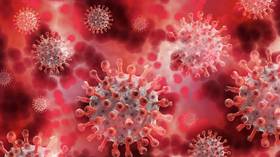Stanford researchers developing single-dose nanoparticle Covid-19 vaccine that doesn’t need cold storage

Researchers have successfully tested a nanoparticle Covid-19 vaccine which, as yet, doesn’t appear to have any of the side effects or distribution issues plaguing the current generation of vaccines in use.
The scientists at the lab of Stanford University biochemist Peter S. Kim were already working on vaccines for the likes of Ebola, HIV and pandemic influenza when the coronavirus pandemic hit, and they quickly channeled all of their efforts into fighting the new scourge.
The team has already produced and tested a promising new vaccine which could provide the solution to many of the issues frustrating global vaccination efforts.
Also on rt.com EU medicines regulator approves Moderna Covid-19 vaccination“Our goal is to make a single-shot vaccine that does not require a cold-chain for storage or transport. If we’re successful at doing it well, it should be cheap too,” said Kim, a professor of biochemistry at the university.
“The target population for our vaccine is low- and middle-income countries.”
The nanoparticles themselves are riddled with the same proteins that give the coronavirus the 'crown' from which its name is derived, and which allow it to enter and infect human cells, hijacking the cellular machinery inside to self-replicate more of the virus.
Excited to see our spike ferritin paper out in @ACSCentSci today. A nice way to celebrate my last week as a postdoc! https://t.co/HolAJPqSzJ
— Abigail Powell (@crabbyabz) January 6, 2021
Nanoparticle vaccines are often just as effective as their virus-based counterparts, while encountering fewer of the drawbacks.
For example, nanoparticle vaccines can be produced faster, don't require the extensive cold storage supply chain for delivery to immunization centers, are less likely to produce side effects, and can be produced at a lower cost, if all goes to plan.
Early results from vaccine tests on mice indicate that Stanford's nanoparticle inoculation may grant immunity after just one dose.
Also on rt.com Family calls for more research after young doctor left paralyzed in wake of taking Pfizer Covid-19 vaccine in MexicoThe researchers are hopeful that the final form of the vaccine could be stored at room temperature and may even be distributed in powder form which, if achievable, would be vastly more straightforward to deliver across the globe.
Many of the current generation of vaccines, such as those produced by Pfizer/BioNtech and Moderna, must be stored at temperatures ranging from eight to -70 degrees Celsius (46 to -94 degrees Fahrenheit), necessitating advanced cold storage infrastructure in order to disseminate, effectively cutting off disadvantaged or far-flung sections of the Earth from the vaccine.
“[We] think it is a solid starting point for what could be a single-dose vaccine regimen that doesn’t rely on using a virus to generate protective antibodies following vaccination,” says lead author Abigail Powell.
Think your friends would be interested? Share this story!













